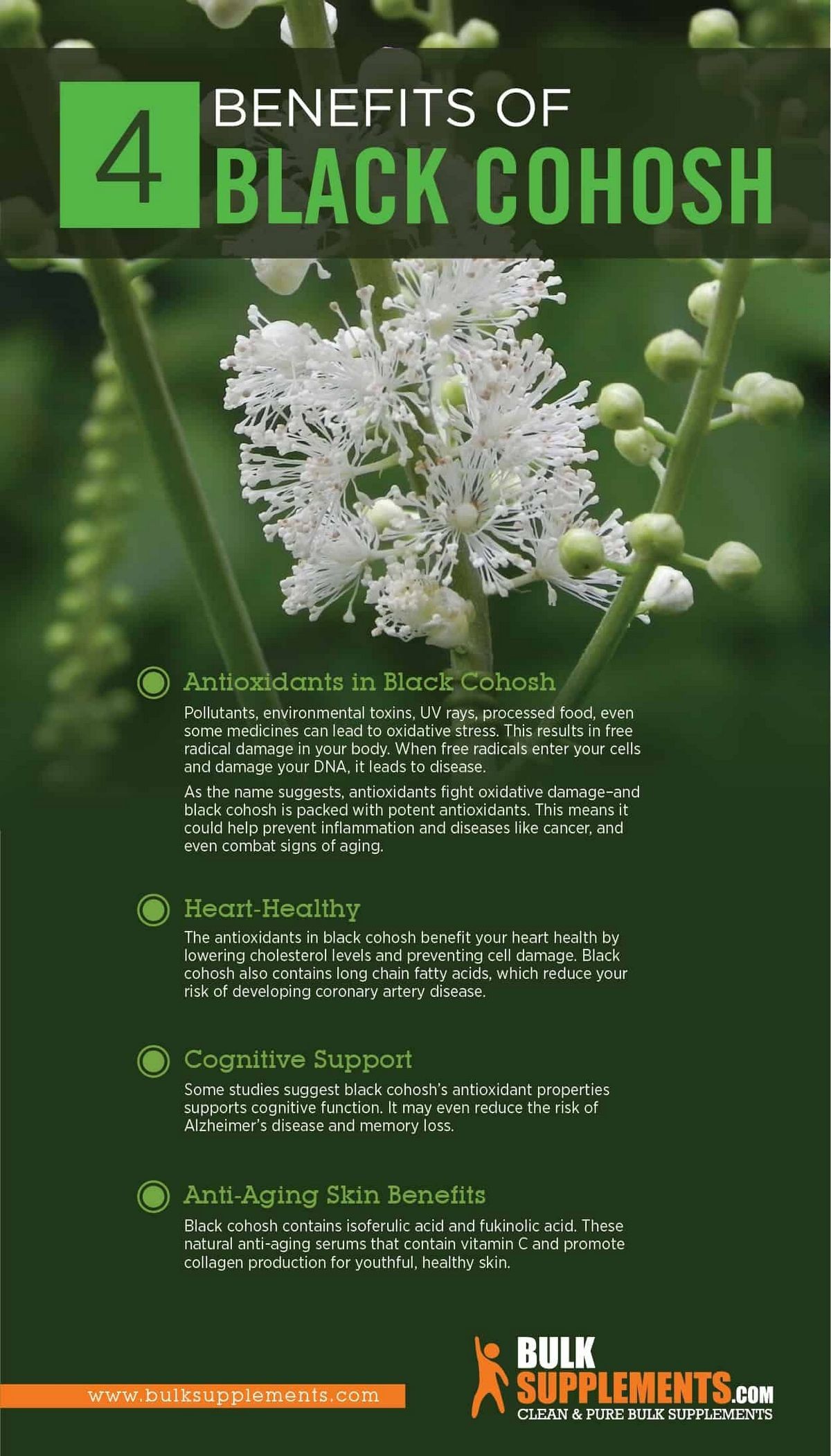
Contents
Black Cohosh
Black cohosh, or Actaea racemosa, is a flowering plant belonging to the buttercup family. It is native to eastern regions of North America.
Traditionally, extracts made from the root and rhizome of black cohosh have been used as an herbal remedy. They are known for relieving menopausal symptoms, treating menstrual irregularities, inducing labor, and addressing coughs, fevers, rheumatoid arthritis, and musculoskeletal pain.
The therapeutic effects of black cohosh may come from various biologically active substances found in the plant. These include triterpene glycosides like actein and cimifugoside, alkaloids, flavonoids, and tannins. The precise mechanism of black cohosh is not fully understood, and studies have yielded mixed results. Research suggests that black cohosh may work in the following ways:
- Modulating the activity of estrogen, the female sex hormone
- Modulating the activity of serotonin, a chemical involved in mood regulation, circadian rhythm, and digestion
- Exhibiting antioxidant activity
- Possessing anti-inflammatory effects
Black cohosh can be purchased over the counter in various forms, including dried or powdered root, liquid extract, tincture, tablets, and capsules. Research indicates that black cohosh may be effective for certain menstrual disorders and postmenopausal vasomotor symptoms such as hot flashes and night sweats. However, evidence is lacking for most other uses. Some suggested uses of black cohosh include:
- Menopausal symptoms such as hot flashes, night sweats, vaginal dryness, sleep disturbances, irritability, and mood swings
Warnings
- Avoid black cohosh if you are hypersensitive to any of its components
- Do not take black cohosh if you have any of the following conditions: breast cancer, endometrial cancer, endometriosis, ovarian cancer, uterine fibroids, or any estrogen-sensitive condition
Side Effects
Common side effects of black cohosh may include nausea, vomiting, gastrointestinal upset, weight gain, a feeling of heaviness, abdominal pain, diarrhea, shortness of breath, slow heart rate, central nervous system disturbances, headache, dizziness, rash, sweating, cramping, joint pains, tremors, and visual disturbances.
Contact your doctor immediately if you experience any of the following symptoms or serious side effects while using this drug:
- Serious heart symptoms such as fast or pounding heartbeats, fluttering in your chest, shortness of breath, and sudden dizziness
- Severe headache, confusion, slurred speech, severe weakness, vomiting, loss of coordination, feeling unsteady
- Severe nervous system reaction with very stiff muscles, high fever, sweating, confusion, fast or uneven heartbeats, tremors, and feeling like you might pass out
- Serious eye symptoms including blurred vision, tunnel vision, eye pain or swelling, or seeing halos around lights
This list does not cover all side effects or adverse reactions that may occur from the use of black cohosh. Contact your doctor for medical advice about serious side effects or adverse reactions. You can also report side effects or health problems to the FDA at 1-800-FDA-1088.
Dosages
There is not enough reliable information on appropriate dosages of black cohosh. Check the manufacturer’s label. Suggested dosing includes:
- Dried root: 300-2000 mg orally three times a day
- Extract: 0.3-2 mL orally once daily; 1:1, 90% alcohol
- Tincture: 2-4 mL orally once daily; 1:10, 60% alcohol
- Tablet: 20-80 mg orally twice daily; standardized to 1 mg triterpene glycosides per 20 mg tablet
Overdose
- No serious adverse effects from black cohosh overdose have been reported. The most common overdose effects are mild gastrointestinal discomfort and rashes, which should resolve with discontinuation of black cohosh. Very high doses may cause abdominal pain, diarrhea, dizziness, slow heart rate, and tremors.
- There have been reports of liver damage from long-term use of black cohosh, but a causal relationship has not been established.
- Supportive and symptomatic care may be used for the treatment of black cohosh overdose.
Drug Interactions
Inform your doctor about all medications you are currently taking to check for possible drug interactions. Do not start, stop, or change the dosage of any medication without your doctor’s recommendation. Black cohosh has no known severe interactions with other drugs. Serious interactions of black cohosh include:
- iobenguane I 131
- nevirapine
- tamoxifen
- tenofovir DF
- zidovudine
The above list does not include all possible interactions or adverse effects. For more information on drug interactions, visit the RxList Drug Interaction Checker. Always inform your doctor, pharmacist, or healthcare provider about all prescription and over-the-counter medications you use, along with their dosages. Maintain a list of this information. If you have any questions about the medication, consult your doctor or healthcare provider.
Pregnancy and Breastfeeding
- Black cohosh may cause uterine contractions and lead to miscarriage or premature labor. Some homeopathic practitioners recommend taking black cohosh at term or near term to induce labor, but the safety of black cohosh use during pregnancy is not established. Avoid taking black cohosh if you are pregnant.
- There is no reliable information on the safety of black cohosh use in nursing mothers. Avoid taking black cohosh if you are breastfeeding.
- Always consult your healthcare provider before taking any herbal supplement, including black cohosh, during pregnancy or while breastfeeding.
Additional Information
- Black cohosh supplements are generally considered safe for most adults when taken orally according to recommended doses for a short period.
- Always follow the instructions on the product label when taking black cohosh.
- Do not mistake black cohosh for blue cohosh, as they are different herbs.
- Consult your healthcare provider before taking any herbal supplement, including black cohosh products.
- Herbal products often contain multiple ingredients. Check the labels of black cohosh products to learn about their components.
- Black cohosh is marketed as an herbal supplement and is not regulated by the FDA. Products may vary in formulations and strengths, and labels may not always match the contents. Use caution when selecting a black cohosh product.
- Keep black cohosh stored safely out of the reach of children.
- In case of overdose, seek medical assistance or contact Poison Control.
By clicking Submit, I agree to the MedicineNet’s Terms & Conditions & Privacy Policy and understand that I may opt out of MedicineNet’s subscriptions at any time.
Summary
Black cohosh is an herbal remedy used for relieving menopausal symptoms, treating menstrual irregularities, inducing labor, and addressing conditions such as coughs, fevers, rheumatoid arthritis, and musculoskeletal pain. Common side effects of black cohosh include nausea, vomiting, gastrointestinal upset, weight gain, a feeling of heaviness, abdominal pain, diarrhea, shortness of breath, slow heart rate, central nervous system disturbances, headache, dizziness, rash, sweating, cramping, joint pains, tremors, and visual disturbances. Black cohosh may cause uterine contractions and lead to miscarriage or premature labor. It should be avoided during pregnancy and breastfeeding.


